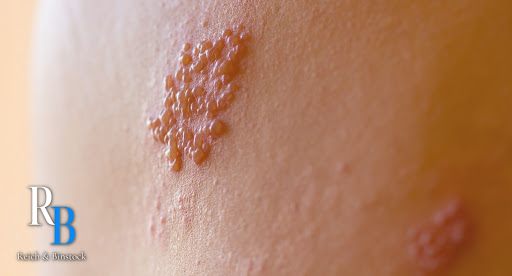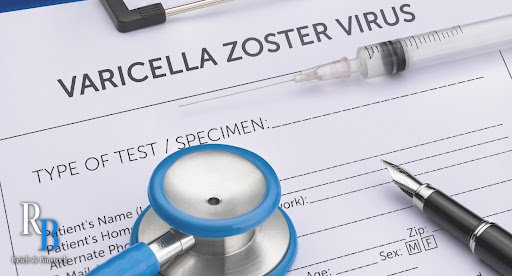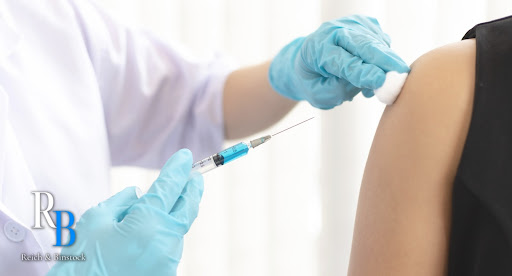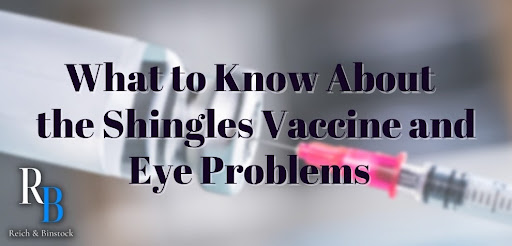Suffering an outbreak of shingles is often described as excruciating. Primarily affecting adults aged 50 or older, singles typically begin as a painful or tingling sensation localized to one side of the head or body. Eventually, a rash made of small, fluid-filled blisters appears. Until this century, a vaccine was not available for this debilitating condition. The first vaccine on the market is called Zostavax. And it’s alleged to cause serious side effects, including those that damage the eyes. So, many people want to know about the shingles vaccine lawsuit and its side effects.
Numerous lawsuits are pending because of the severity and number of persons experiencing vision and other health concerns after getting a Zostavax injection. Reich & Binstock’s skilled Houston pharmaceutical injury attorneys discuss shingles, shots, vaccine side effects, and current litigation in the following blog. To schedule a free and confidential consultation with us, please call 713-622-7271.
What Are Shingles?

The varicella-zoster virus causes chickenpox in young children. It also causes shingles. When an episode results in chickenpox, the virus is called varicella. When the virus triggers shingles, it is called zoster.
Shingles are also called herpes zoster. The varicella-zoster belongs to the group of herpes viruses, including strains that cause cold sores and genital herpes. In contrast to chickenpox and shingles, a different virus causes cold sores and genital herpes.
The varicella-zoster virus stays inactive in your body after you have chickenpox. It lies near your brain and spinal cord within your nerve tissue.
The virus can activate later as shingles. It causes a painful rash that can occur at any place on the body but usually on the left or right side of the torso. It often appears as a single strip of blisters wrapping around the body.
Physicians recommend vaccines to reduce the risk of having shingles. Further, treating an infection right away minimizes the possibility of complications and shortens the illness.
What Causes Shingles?

You can develop shingles after experiencing chickenpox. This is because the varicella-zoster virus causes chickenpox and lies dormant in your nervous system after you recover.
At some point, the virus can reactivate. It moves along nerve pathways to your skin. Once there, shingles appear. It’s important to note that shingles do not develop in everyone who had chickenpox.
A clear cause of shingles is unknown. However, it’s more common in those with lowered immune systems or older adults. The highest occurrence of shingles is in adults aged 50 or older.
Shingles Symptoms
Typically, the first sign of a shingles infection is pain that can be intense. Because pain and shingles are usually present on the torso, it gets mistaken for heart, kidney, or lung issues. Still, some people only experience pain, and the rash never appears.
Symptoms typically affect a small portion of one side of the body. Sufferers may experience:
- Tingling, numbness, pain, or burning sensation
- Skin is sensitive
- A red rash that appears days after the pain begins
- Blisters that pop open and scab over
- Itching
- Fever
- Headaches
- Light sensitivity
- Fatigue
The shingles rash often resembles a stripe of blisters wrapping around one side of the torso, face or neck, or around one eye.
Shingles Complications
Some people suffer complications after the shingles rash subsides. These commonly include:
- Postherpetic neuralgia – This is a pain in the location of the shingles rash long after the infection clears. Damaged nerves cause intense pain lasting three months or more.
- Bacterial skin infection – Bacteria can enter open shingles blisters and cause infection.
- Face pain – There are three nerve branches in the face. When shingles impact these nerves, lingering pain may occur.
- Damaged eye – One of these facial nerves branches to the eye. If affected by shingles, severe eye damage can occur.
Is Shingles Contagious?
Someone who is not immune to chickenpox can catch the varicella-zoster virus from someone with shingles. This occurs through contact with open rash sores. However, the exposed person develops chickenpox instead of shingles.
The blisters are contagious until scabs form. An afflicted person should not have physical contact with people who’ve never had chickenpox or the chickenpox vaccine. People vulnerable to the condition include anyone with a weak immune system, pregnant women, and newborns.
Can You Die From Shingles?
Although it can be a painful condition, shingles are not often deadly. If death occurs, it’s due to complications from the virus.
When Should You See A Doctor?
You’ll want to see your doctor if you believe you have shingles. However, it is critical that you seek medical care in these circumstances:
- Permanent damage is possible if pain and rash near an eye if not treated.
- Age increases the risk of complications. It’s essential to visit your physician if you are older than 60.
- If you or a family member have a weak immune system
- A painful rash on a large section of your body
Is the Shingles Vaccine Safe?

The shingles vaccine, Zostavax, was the only shingles vaccine available until 2017. That’s when GlaxoSmithKline put Shingrix on the market.
Zostavax litigation pending across the U.S. alleges Merck failed to inform injection recipients of the vaccine’s side effects adequately. Additionally, the pharmaceutical powerhouse faces accusations about:
- Misrepresenting the safety and efficacy of Zostavax
- Producing a faulty vaccine
- Falsely claiming the vaccine does not cause shingles
- Its vaccine causes severe side effects, including death.
- Even though Merck knew Zostavax could seriously injure patients, it continued to sell it.
Should an injection recipient develop shingles due to the vaccine, they are at risk for the virus’ complications such as brain inflammation (encephalitis) and neurological disorders. These complications can lead to facial paralysis (Bell’s Palsy), stroke, balance or hearing problems, or even death. Other complications include the following:
- Meningitis
- Pneumonia
- Congestive Heart Failure
- Acute Disseminated Encephalomyelitis
- Guillain-Barre syndrome
- Post-herpetic Neuralgia (nerve pain)
- Myelitis (spinal cord inflammation)
- Vision problems: blindness, retinal damage, Acute Retinal Necrosis
Side Effects of Shingles Vaccine
One in six people feels ill after being vaccinated with Shingrix, per the Centers for Disease Control (CDC). (Shingrix is the shingles vaccine currently available in the U.S.) This feeling may last a few days. Of those who react, some may be after the first dose, while others may experience side effects after dose two.
Common side effects of a shingles vaccination include headache and fatigue, muscle pain, fever and chills, stomach discomfort and nausea, as well as redness, swelling, or mild to moderate pain at the injection site.
Side effects from receiving the Zostavax shingles vaccine are allegedly much more severe.
What is Zostavax?
Zostavax is a vaccine for adults older than 60 to prevent shingles and postherpetic neuralgia (a common side effect of a shingles infection). The vaccine was recommended even if a person had chickenpox or shingles previously. It offered approximately five years of protection.
The vaccine was available to patients beginning in 2006. However, since Nov. 18, 2020, the Zostavax shingles vaccine is not recommended in the U.S.
Zostavax Lawsuit

Multitudes of Zostavax vaccine lawsuits filed in the U.S. court system claim Zostavax manufacturer Merck manufactured and sold an injection that was defective and unreasonably dangerous. The vaccine contains a “live, attenuated virus.” This means the vaccination uses a live, weakened form of the shingles virus. Lawsuits allege Merck did not weaken the virus enough.
These lawsuits allege that instead of preventing shingles, the vaccination causes them. A shingles outbreak resulting from the Zostavax shingle shot is reportedly worse than non-vaccine-related infections.
Federal litigation for these lawsuits is centralized in the Eastern District of Pennsylvania. This is for coordinating discovery and pretrial proceedings for the Zostavax multi-district litigation (MDL). The litigation should grow as investigations into injury claims continue and additional claims filed.
Zostavax Side Effects
Per the Federal Drug Administration (FDA), Zostavax side effects included shingles, chickenpox, injection site hives, joint and muscle pain, rash, nausea, fever, and headache. More severe complications are possible. These side effects include congestive heart failure, hearing loss, stroke, spinal cord inflammation, vision loss, post herpetic neuralgia, and even death.
Still, other vaccine recipients report seizures and other severe neurological disorders, brain damage, fatal liver failure, chronic inflammatory demyelinating polyneuropathy, Bell’s palsy (facial paralysis), and limb paralysis. Autoimmune disorders such as Meniere’s Disease, Guillain-Barre syndrome, and Chronic Inflammatory Demyelinating Polyneuropathy are also reported.
See Also: Radiculopathy vs Neuropathy
Zostavax lawsuits allege a connection between the shingles vaccine and eye issues. Eye issues reported by Zostavax shingles vaccine patients detail blurred vision, blindness, necrotizing retinitis, and acute retinal necrosis.
Zostavax vs Shingrix
The two vaccines treat the same virus. However, they have significant differences. Shingrix is 98% effective for adults aged 50-69, while Zostavax is only 51% effective. Further, Shingrix is also 91% effective against post-herpetic neuralgia in people older than 50, and Zostavax is 67% effective. Zostavax also only has a 51% effective rate against shingles – the virus it’s intended to prevent.
As previously stated, Zostavax uses a weakened live virus. Shingrix utilizes a non-live portion of the herpes zoster virus, called a sub-unit vaccine. This lowers the risk of an adverse reaction. Persons with weakened immune systems should not get a live-virus vaccination. A sub-unit vaccine is safe.
The CDC only recommends Zostavax for those allergic to Shingrix.
What Could I Collect in a Zostavax Lawsuit?
If you are eligible to join a Zostavax lawsuit, your medical bills, suffering, lost wages, and more could be recoverable. Right now, a small group of six bellwether cases, known as “Group A Bellwether Pool,” is readying for trial. This case pool helps determine each side’s weaknesses and strengths. It also helps with future settlement negotiations. Bellwether trial results are not binding.
Do I Need a Shingles Vaccine Lawyer?
Zostavax is not a routine childhood vaccine. This means the federal Vaccine Injury Compensation Program doesn’t cover it. Those with serious injuries must file a lawsuit instead.
A Houston pharmaceuticals injury attorney can help you file a shingles vaccine lawsuit against Merck.
Shingles Vaccine Lawyers in Houston
You need a solid legal team on your side if you’re looking to take on pharmaceutical companies. Reich & Binstock’s Houston pharmaceuticals injury lawyers have the experience, skills, and tenacity to challenge Merck in court for its negligence.
We offer a free, no-obligation consultation if Zostavax caused your vaccine injury. Our phone number is 713-622-7271. Reich & Binstock has a solid reputation for fighting against drug manufacturers and handles cases for clients experiencing injuries from medicines such as Injectafer, Xeljanz, Zantac, Elmiron, and more.














